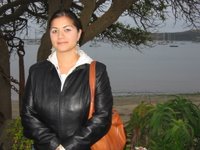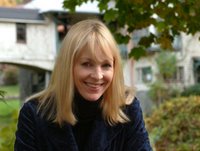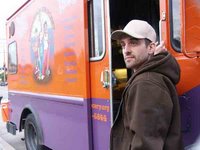
Last week I sat down with a former co-worker, Mei-ying Ho, who is now the Co-Director of
SOUL, for an interview for my Big Vision
podcast. The podcast isn't up yet, but here is a partially modified transcription of our conversation which you can also read along with profiles of other Solutionary Women on
Blogher:
What is SOUL?
SOUL is a training center based here in Oakland. We just recently moved to downtown Oakland, and we talk about ourselves as a school to build a movement. We place ourselves in the social justice work here in the Bay Area as a training center. We focus on political education and organizer skills trainings, and we definitely think it is critical to see the fusion of those two things.
Our political education starts on a very basic level by identifying the systems of oppression that we live under here in the United States. We see four primary systems of oppression that we need to address on a very basic level to get through to the subsequent systems. We start talking about classism, as it relates to capitalism, and then move to heterosexism, also talked about more broadly as homophobia. We talk about male supremacy, known more loosely as sexism, and then white supremacy as it relates to racism.
In focusing on those four systems, we recognize institutionally how critical it is to merge the discussion about these various systems and political education to organizing, and how organizing is one method to initiate change for a more just world. We work with a lot of young organizers as well as elder organizers, and we have about seven different programs to speak to that fusion. We definitely promote an organizing orientation to education work.
How did you get involved with this kind of work?
I feel like I was really born into it. Both my parents and my older brother, just on a very early, early, early level started introducing me to concepts. I really feel like I was bred that way. I think my first political action was, just to age myself, I was in the 5th grade, against the first Gulf War. So I’m only 26. And in terms of how I got involved with SOUL, I was actually teaching for a very brief period in the Oakland middle schools. I was teaching 8th grade, and once I realized that I needed to live a little longer before I just jumped right in, I enrolled in SOUL’s organizing 101 Program, and then immediately, the next season, enrolled in SOUL’s Movement 101. It was during that time that I was recruited to participate in the volunteer-based program, The Teaching Collective, which actually helps to facilitate introductory level political education workshops in various high schools and youth organizing groups. I was a volunteer for maybe 8 or 9 months and was then recruited to take a position at the organization, or at least to apply for a position here.
I was at that time working at a wonderful organization called Streetside Stories, which is a literacy arts organization with programming in various Title 1 middle schools in San Francisco. Given that I grew up in San Francisco, born and raised, it was a really unique opportunity to get to work, and get more hands on experience in the schools. After the school year ended, I ended up taking the job with SOUL and I’ve been here almost three years now. For the first year and a half I was working as the coordinator of the educational alternative program that goes out into the high schools, and then was recruited to apply for the position of co-directorship here. For the past year and a half I’ve been the Co-Director of Organizational Development and Communications here at SOUL.
What do you enjoy the most about your work at SOUL?
I think what I enjoy the most about working here at SOUL is having the opportunity to work with a really amazing group of folks here on staff, but then just more broadly having an eye to the different organizations doing the work on the ground here in the Bay Area, and all over the country: service institutions, advocacy organizations and on the ground base-building groups that do the outreach to build the membership to sustain the fight. It’s been a really incredible ride. There are challenging moments, for sure, but it’s definitely been exciting for me and really humbling for me as a young woman of color to come into this work and recognize that I also have something to give and so much to learn. It’s really exciting to be in community with people in this way.
And what’s the most challenging thing about your work?
I actually feel like probably the most challenging thing for me here is kinda recognizing what I have to offer, you know. I think that’s probably one of the main things I come into contact with on a regular basis is my own self-doubt, and recognizing that the ways in which the systems of oppression affect us all on an individual level, also affect us on a community level. It definitely has had an impact on the way that I have learned about myself and learned about my ability to fight and to fight back. Lucky for me, I have an amazing community to fall back on and to also push me to recognize my strength. There is day-to-day stuff that’s hard and crises that come up with people, and with myself, that are hard, but I think probably the main stuff is getting over the personal impact that the political has on us every day.
And if someone you were working with said to you that the hardest thing about the organizing work I’m doing is the personal impact that the political has on me every day, what advice would you give them?
That’s a hard one. I think everybody has different things that we all utilize to take care of ourselves, but I think beyond that, I’ve definitely learned that it’s important to always push ourselves too, to not just get caught up in all the self-care this, and self-care that, ’cause it’s so easy here in the Bay Area to fall into that trap. I think it is also important to recognize that we have a community to stay accountable to, and they’ll help us to be accountable to ourselves. So I often encourage myself and my comrades and my friends and family to lean on each other and to build community, whether that’s like creating a woman’s circle or a study group, I think there are different ways in which we can push each other and then, therefore, ourselves. Even it’s like, lets’ go for a hike and talk about the main issues that we’re having right now in the work. I think it’s important ‘cause we all have lessons to learn, but we all have lessons to teach, and I think sometimes we forget that it’s not easy for any one of us.
What are some resources you can recommend to people who are interested in this kind of work, or your favorite book?
I don’t know if I have a favorite book. I think the different writers who have been really helpful for me in trying to find out my own light amid the darkness, is definitely writing myself, you know, definitely taking the time to journal myself, but I also find a lot of inspiration from different feminist writers, Bell Hooks, June Jordan and Suheir Hammad. I like novels, Julia Alvarez, different people. I read a lot of theory stuff, too.
If there is a person who is interested in organizing, but they can’t come to your trainings, what are some action steps they can take?
Well, actually this organization, POWER, People Organized to Win Employment Rights, just came out with a great book called Towards Land Work and Power that’s super, super accessible. It’s actually in three different languages, Chinese, Spanish and English. It’s written for conscious organizers, by conscious organizers. I think it is a really good breakdown of what is currently happening in San Francisco in terms of the gentrification. Even if you’re not in San Francisco, even if you’re somebody who lives on the other side of the country, or the other side of the world, I think it’s a really good eye into the current state of imperialism in the Bay Area.
We also here at SOUL sell manuals. We have a political education workshop manual that we utilize for our introductory level workshop. We also have a global justice training manual that was written after 9/11, and then we have our training for trainers manual which is exactly the curriculum for our training for trainers program. Also, this year, we’re going to be coming out with our national youth organizing manual, as well as a revised version of our political education training manual, and our supervision manual,that speaks more to organizational development stuff.
We really encourage here at SOUL that people get involved with organizations, even if it is on a volunteer level to just get involved either with an organization doing outreach stuff, or even if it’s data entry, just to get an eye into the feel of an organization, ‘cause all organizations are different. Their culture. Their method. Their practice. If it’s a base-building organization, or if it’s a service organization, get involved to get a feel about what fits your personality. It definitely takes some getting used to to get involved on a volunteer level and to step back, because a lot of us that want to get involved are already leaders in different capacities, so to just humble ourselves and to enter in from a space of learning sometimes can be challenging, but it can be really helpful towards finding our path: what’s most interesting, what are we good at, how can we best utilize our skills and how can we best be helpful. And there’s such a wealth of organizations here in the Bay Area to plug into.
How do you prevent burn out?
I have definitely learned in the past year and a half to take my weekends as weekends, even if it’s just one day. I like to hang out with my friends and the babies in our community, to spend time with the little ones. I like to volunteer with other organizations, which sometimes feels like work if I’m not in a good headspace, but oftentimes can feel very rejuvenating for me, even if it's just tutoring or something like that. Spending time with my family. You know, just being a regular person, too.
What do you feel hopeful about?
I definitely take hope from fights that are happening on an international level and I try to remind myself always on a human level how we can build power. I mean it starts with us, but it’s also about like what’s happening on the immigrant rights front right now. It’s totally amazing, definitely inspiring. Being able to march in the streets on May Day! I definitely feel like recognizing the beauty in the communities that we work in and that I’m immersed in all the time is really, really fresh. I think also just recognizing that the community that I’ve had the opportunity to build for myself on a personal level is also the community that I’ve built trying to help out on a political level, it is super overlapped for me, is helpful to feel inspired.
I don’t think there’s any one answer. I feel really blessed to be able to live here in the Bay Area still and still actually pay rent in San Francisco. It’s hard, but being able to take walks in the Mission, in the part of the Mission that still exists, being able to walk around Chinatown, like all that stuff is really, really cool. That sounds cheesy, but it’s true.
I think this work is a work in progress. It’s progressive work in progress. I definitely, at the ripe age of 26, don’t have all the answers, but we’re learning it together, you know, and it’s really cool to be able to do this work for my life, you know. It’s pretty cool. I just feel really lucky.
For more information about SOUL go to www.schoolofunityandliberation.org
If you know a Solutionary Woman who works at a nonprofit or NGO who you think I should profile, please email me at britt at brittbravo dot com with their name, organization and contact info.
organizingeducationpolitics







